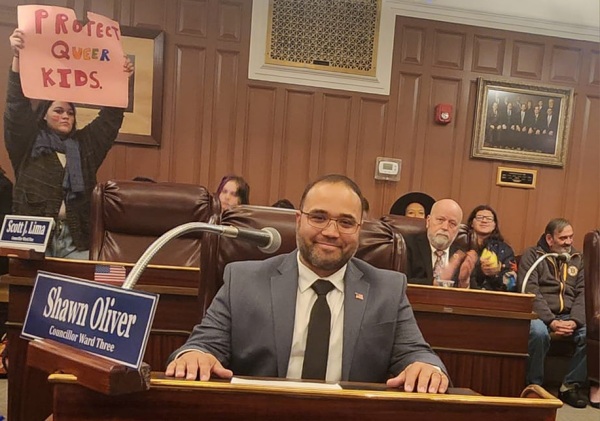Council Approves Boston Rent Cap Plan On 11-2 Vote
By Chris Lisinski
State House News Service
Beacon Hill, it’s your turn to take a stance on rent control in Boston.
The Boston City Council voted 11-2 on Wednesday in favor of Mayor Michelle Wu’s home rule petition seeking to carve an opening in the statewide rent control ban voters approved nearly three decades ago.
Wu plans to sign the measure in the coming days, a final procedural step that will send the matter to Legislature for review and kick off the next phase in a heated debate that has already drawn a six-figure opposition campaign from one real estate group.
Backers of the policy said Wednesday they view it as an imperfect but necessary tool to soften the financial pressures Bostonians face and to keep people in their homes.
“Boston is increasingly out of reach for a majority of our seniors, immigrant populations, families and individuals,” said Councilor Gabriela Coletta. “Bad actors who take advantage of a bullish rental market can and do price gouge in a way that is displacing hardworking individuals who just want to be able to live in this city and contribute to our local economy. There is urgency to get this done, especially in my district, and I feel this urgency every single day.”
Councilors Frank Baker and Erin Murphy, both of Dorchester, voted against the home rule petition.
Baker argued that the policy would villainize property owners who he said have “created generational wealth for the middle class in Boston.”
“It’s not easy being a landlord, especially a small landlord,” Baker said, later adding, “The landlord, the owner, is evil in this discussion, and that has to stop. It has to stop because the good landlords, if they’re not ready to go now, they’re getting ready to go. Just on its face, rent control, I believe, is bad policy.”
The home-rule petition Wu filed would limit the amount landlords could increase rent each year to 6 percent plus the change in the Consumer Price Index, with a combined maximum total of 10 percent. In lower-inflation years where the CPI grows 2 percent, the rent cap would be 8 percent; in higher-inflation years, rents could not grow more than 10 percent.
Wu previously told councilors that advertised rents across Boston increased 14 percent in 2022, and prices jumped more than 20 percent in some neighborhoods.
“Today, the City Council delivered a strong message that the city of Boston needs the tools to address our housing crisis,” Wu told reporters after the vote. “We hear from residents across every single neighborhood just how dire it is, and we see families who are getting pushed out of the communities they grew up in and helped build. This is affecting everything from how our businesses and economy can recover to our school enrollment and the stability of every part of our neighborhoods.”
The proposal includes several exemptions. Newly built, added or converted units would not be subject to rent control until their owner occupancy certificates are 15 years old.
Owner-occupied buildings with six or fewer units would not be subject to a limit on rents, and landlords would not face a cap the first year a new tenant moves in, allowing them to reset the price to market value.
Councilor Ricardo Arroyo said the proposed cap would apply to about 55 percent of the city’s rental units.
“This is a monumental act for the city of Boston,” Arroyo said.
During Wednesday’s meeting, the panel rejected an amendment proposed by Councilor Michael Flaherty that would have extended the exemption to properties held by any Boston resident with six or fewer units, not just those where the owner lives in one of the units.
“They should be exempt as if they are owner-occupied because in many instances, it’s the house next door to them. A family member left it to them, or they bought a brother or sister’s house,” Flaherty said.
Councilors shot down the change 9-4, with Baker, Flaherty, Murphy and Council President Ed Flynn in support.
Other tenant protections in the home rule petition include a requirement that landlords have a demonstrable cause to evict tenants.
Several other U.S. cities including San Francisco and Washington, D.C. have rent control policies, which Wu said served as a basis for her proposal.
Boston is home to some of the highest rents in the country, leaving many residents to pay a sizable share of their income on housing, and prices continue to climb amid competition for a limited number of open apartments. According to Councilor Liz Breadon, only about half of 1 percent of Boston’s rental units are vacant.
“The reality is this is not a normal market. This is a desperation market,” said Councilor Kenzie Bok. “Because of the half a percent or less of vacancy that Councilor Breadon referenced, it’s a ‘your money or your life’ kind of situation. That’s not the kind of situation that government should enable.”
Real estate and landlord groups that oppose rent control argue it would stifle housing production, exacerbating a crisis of high prices and displacement fueled in large part by insufficient supply.
The Greater Boston Real Estate Board launched a nearly $400,000 campaign involving digital ads and mailers trying to rally voters against the policy.
“We are disappointed but not totally surprised by the Boston City Council’s vote in support of rent control. That is why our campaign was always focused on the long game,” Greg Vasil, the group’s CEO, said Wednesday. “And make no mistake, the fight is just beginning. As the bill makes its way to Beacon Hill, we are prepared to expand the Rent Control Hurts Housing campaign to educate voters and legislators on the serious harm rent control will have on the residents of the Commonwealth. We look forward to promoting pro-housing policies focused on decreasing red tape, additional costs, and regulatory burdens, while increasing production as the path to overcoming the state’s affordability crisis.”
The pricey campaign underscores the intensity of the fight already playing out. Councilor Ruthzee Louijeune said Wednesday that rent control opponents sent a “tracker” to one of her events with constituents to monitor her remarks about the topic.
“We’re doing something good when the real estate industry is so scared and when they are making sure that they are putting in so much money to prevent this from passing,” Louijeune said from the chamber floor.
Whether the state’s most populous city can implement an annual cap on rent increases applying to more than half of its units will now land firmly and completely on the shoulders of House and Senate Democrats who have shown little interest in the idea in the 29 years since voters narrowly approved a ballot question prohibiting rent control across Massachusetts.
In 2020, the House rejected a Rep. Mike Connolly amendment to a sweeping economic development bill that would have authorized several local-option tenant protection measures including rent control.
Supporters might feel more optimistic about Boston’s chances now that Gov. Charlie Baker, who opposed reviving rent control, is no longer in office. Gov. Maura Healey has not explicitly endorsed Wu’s push, though she has said generally that she supports the efforts of local leaders to make their own decisions about the policy.
The petition’s advancement comes as Healey mounts an effort to address what she describes as a housing crisis, a problem so significant that she wants to create an entire Cabinet secretariat focused on coming up with solutions.
Asked Wednesday about the chances of success in a Legislature where home rule petitions do not always find a favorable audience, Wu said, “We all represent the same constituents.”
“We all hear from the same families who are struggling to hang on in the city as prices at the grocery store go up, as prices at the pump go up, as prices in housing and rent go up. I think we all share an urgency in knowing that this can’t stand for Boston,” she said. “We cannot be a place where people get pushed out from the communities that they want to continue contributing to. We’ll make that case up at the State House, and we are going to go up strong with a big voice from city government in doing so.”
Boston might not be the only major metropolitan community seeking state permission to revive rent control at the local level despite the 1994 ballot question banning it.
Somerville City Council President Ben Ewen-Campen said his panel will start work this week on its own “rent stabilization” measure, an idea that its mayor, Katjana Ballantyne, endorsed during her campaign.
“With Boston making unprecedented progress to limit rent-gouging, and with a new Governor who has supported municipal decision-making on this issue, the time is now for us begin working in earnest on a policy that works for Somerville,” Ewen-Campen tweeted on Tuesday on Tuesday.
The Boston City Council on Wednesday also approved, with an identical 11-2 vote featuring opposition from Baker and Murphy, a separate home rule petition Wu filed that seeks to overhaul the Boston Planning and Development Agency structure.








